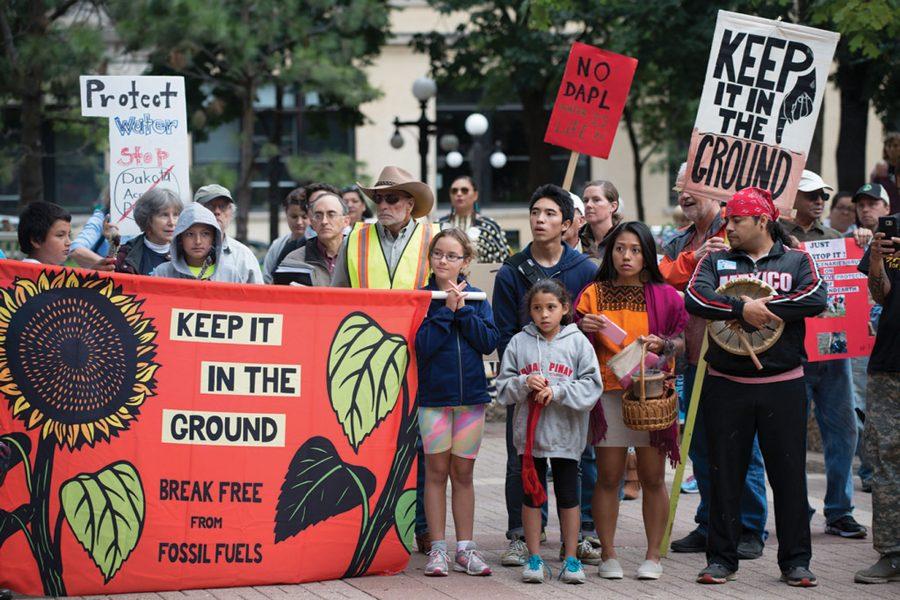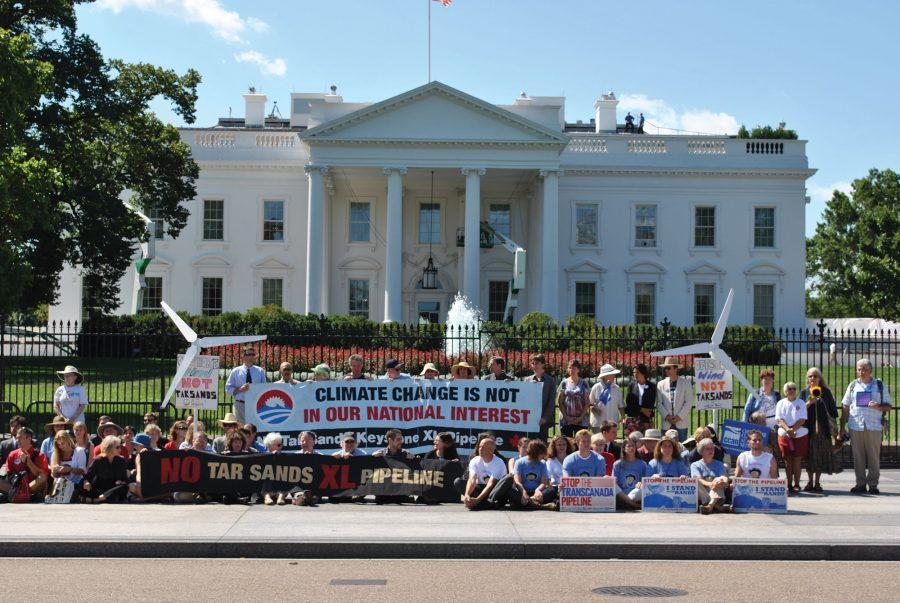Pipeline perplexity
February 2, 2017
Donald Trump‘s first days in office have already brought “yuge” efforts to unravel the environmental legacy of former President Barack Obama. These efforts include his Jan. 24 signing of Executive Orders to revive the production of the Keystone XL and Dakota Access Pipeline (DAPL). Although Trump is a self-proclaimed ‘environmentalist’ and has recently been advocating for solar energy, he has removed the United States from the forefront of global environmental advocates.
“From now on we’re going to start making pipelines in the United States,” Trump said after signing these orders. “Like we used to do in the old days.”
However, America is not the same country as it was in the “old days”.
Our nation has shown extreme growth in environmental awareness over the past decade, and with this awareness stemmed the desire to take action. During the Obama Administration, fuel efficiency standards were raised, the Clean Power Plan was introduced, the Paris Agreement was signed with 195 other countries and production of both the Keystone XL Pipeline and DAPL was halted.
Our president, however, has shown, time and time again his ignorance towards environmental issues, and supporting the construction of these pipelines is just one example.
Pipelines are a bad idea. Plain and simple. They provide potential social, economic and environmental problems, and if the pipelines are built, they will not only be posing a threat towards the wellbeing of millions of people, they will pose a potential threat to the wellbeing of America.
The proposed Keystone XL Pipeline would be an extension of the Keystone pipeline which already exists in the United States. It would carry crude, unrefined oil 1,200 miles from tar sands in Canada, towards oil refineries in Nebraska. It would not only run across six states, but it would also travel over many rivers and aquifers that provide clean water to hundreds of thousands of farms and homes.
From an environmental viewpoint, the fact that this pipeline would be carrying crude oil is a major red flag. According to the National Resources Defense Council (NRDC), crude oil is much more corrosive than other natural resources, and will wear down the pipes they are transported in, making these crude oil pipelines much more prone to leaks and spills.
If the Keystone XL Pipeline happens to leak over Nebraska’s Ollaga Aquifer, the nation will be in trouble. According to the Washington Post, this aquifer provides fresh water to eight states and over one fourth of the nation’s cropland. Ninety two miles of the proposed Keystone XL Pipeline would run over it. If the pipeline does leak over this stretch of land, not only will millions of people’s drinking water be contaminated, but the agriculture industry that gives the “breadbasket” of America its nickname would be significantly harmed.
Extracting the unrefined oil from tar sands for this pipeline also proves to be inefficient and wasteful. According to the NRDC, extracting oil from tar sands requires an amount of energy equal to Americans driving 60 billion more miles every year, increasing carbon pollution. Oil extraction also requires three barrels of water to extract one barrel of oil. Of those three barrels of water, 95 percent is then considered contaminated to the point of toxicity and has to be stored in manmade “tailing ponds” to prevent further pollution.
By promoting pipelines, we would also be taking a step backwards in our efforts to switch to clean, renewable energy by supporting the use of oil for fuel. Not only would pipelines show America’s support of fossil fuel use, but they would aid in the extraction, refining and exportation of these fuels as well.
According to the Washington Post, the Dakota Access Pipeline is another crude oil pipeline whose construction was halted in North Dakota and would run almost 1,200 miles through North and South Dakota, Iowa and Illinois. Among similar environmental issues as the Keystone XL Pipeline, this pipeline’s path also poses a major social problem.
The proposed path of the DAPL would run through sacred land on Standing Rock Sioux Tribe’s reservation in North Dakota. It would not only threaten the tribe’s water supply by running through the Missouri River, but it would violate yet another treaty that sanctions Native American land. By approving the production of the DAPL, Trump is showing his alliance with oil companies and not with the many hurting people of this country.
What message are we sending to Native American tribes and minority groups across the country when we disrupt their already diminished reservations or cultures solely to promote big business? I thought that America prided itself as the “mother of exiles” accepting the “poor, huddled masses” and giving them the chance for a better life. When companies blindly disrupt cultures in an effort to better themselves, we do not see the America we envisioned when those words were put on the Statue of Liberty.
Many people argue for pipelines on the grounds that it benefits American economy. However, this is not necessarily the case. From the eyes of a sustainable workforce, pipelines pose a problem. According to the Labor Network for Sustainability, during the construction of pipelines over 2,000 minimum wage jobs are created, according to the NRDC, but what happens once the pipeline is completed? All of those people are out of jobs. In addition, it only takes a select few people to help a completed pipeline run, so in the long run, the number of jobs actually created by pipelines are miniscule. Why keep promoting unsustainable jobs and energy sources when renewable energy is long-lasting and provides stable job opportunities?
If workers are going to demand jobs, we should at least provide them with jobs that last and promote the future of sustainable energy, not destroy it.
Both the DAPL and the Keystone XL pipelines have the potential to cause much more harm than good. Why would we put government money (over nine billion dollars collectively) in a project that would upset environmentalists, harm sustainable economy and the deplete resources? America should focus its time and money on exploring the future of renewable energy and not on trying to get the most out a dwindling resource.
Climate change is a bigger issue today than it has ever been. Now is not the time to be straying from environmentally friendly practices. It is the time to embrace them.





















![Movie poster for '[Rec]" (2007).](https://www.lionnewspaper.com/wp-content/uploads/2023/04/rec-640x900.jpg)




